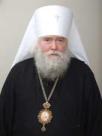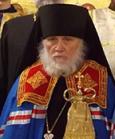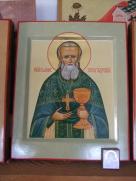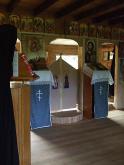Thursday, August 28, 2014
Dormition of the Most-Holy Mother of God
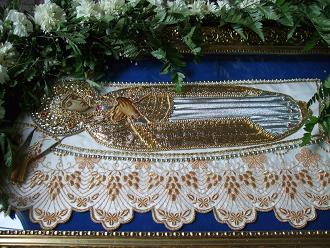 The Mother of God is translated from earth to Heaven. Instead of sorrow, her death brings the Apostles and all the faithful for all time unexpected JOY. She goes to be with her Son, just as every pious Christian who has lived his life worthily will go to be with Him when they die. And She, who is closest of all created beings to Her Son, prays for us continually:
The Mother of God is translated from earth to Heaven. Instead of sorrow, her death brings the Apostles and all the faithful for all time unexpected JOY. She goes to be with her Son, just as every pious Christian who has lived his life worthily will go to be with Him when they die. And She, who is closest of all created beings to Her Son, prays for us continually:
Neither the tomb nor death had power over the Theotokos, who is ever watchful in her prayers and in whose intercession lies unfailing hope. For as the Mother of Life she has been transported into life by Him who dwelt within her ever-virgin womb. Kondak of the feast of Dormition
The Mother of God is holy because She contained within herself the Creator of everything…however, She was a human, born into the same sinful world as us. Instead of choosing sin, She chose virtue in every circumstance, struggling successfully against every temptation in life.
For He hath regarded the low estate of His handmaiden…for, behold, from henceforth all generations shall call me blessed. For He that is mighty hath done to me great things; and holy is His name. And His mercy is on them that fear Him from generation to generation. Lk1:48-50
These are not simply excited words of happiness, nor guesswork, or accidental foreboding but rather, prophesies in the most exact sense of the word. It is the word of the Holy Spirit in the mouth of Mary, the announcement of God’s providential will for her destiny, and about our obligations to her.
We see that the holy Virgin, after the announcement of Archangel Gabriel, went to the house of Zacharias. What does that home signify? That home is blessed by deeds of piety. It is a home where God is known, which honours Him with reverence and diligently serves Him. In it She will see nothing but examples that awaken, strengthen and support Her zealousness and piety. This is the company the holy Virgin seeks.
What should we conclude from this? That we in our acquaintances need to be extremely careful. In our choice of friends we need to look not at status, merit, or nationality, nor at importance or riches, nor at the glamour of fortune, nor at natural capabilities, nor at lively character, nor at a person’s extensive mind and fame, but rather - at the person’s virtue and committed life, at their piety, at their righteous soul, purity of heart and chaste morals.
I have chosen rather to be an outcast in the house of my God, than to dwell in the tents of sinners. Psalm 83:11
So says King and Prophet David about himself. Here is the example by which we must evaluate homes and friends, and thus distinguish with whom we can or cannot have close relationships.
If sinners have distanced themselves from the Lord; then it is to our profit and our responsibility to distance ourselves from them. This does not mean being unfriendly or lack of love towards sinners - it simply means that sinners should not be our close ones - they should not have an insight into the treasure of our soul.
Let our true friendships rather be with Christians, with people fully devoted to God, Whom we must love above all and more than everything.
Where do we find such friends? God might grant us to find them in unexpected places - but they are more likely found in the Church community than in the secular world. However, even in the Church community, people have advanced in their spiritual life to different degrees. We should emulate the perfect, and at the same time remain loving toward all, including those making their first, perhaps clumsy steps in the faith.
Let us notice, also, that the holy Virgin Mary places her joy in God, rather than in her friends and relatives, whom she was with at this time:
And my spirit hath rejoiced in God my Saviour. Lk1:47
Let the example of the Mother of God teach us to place our joy in God alone. For He is the highest perfection of Good and the Source of all happiness. He sent His only Son, our Lord Jesus Christ from heaven to earth, in order to avert men’s hearts from the vanities of this world and to attract them to Himself. By these means He wishes to make all people partakers of His own goodness.
Therefore, we need to search for happiness, not for the flesh and blood, but for the soul. We should not busy ourselves too much with gathering earthly acquisitions or earthly, worldly friendships. Rather, we should concentrate on acquiring heavenly treasures. This mystical treasure will be ours to see after we die - just as the Mother of God found Her treasure when She died. She died bodily, like any earthborn person - but after three days, Her body was no longer found in the tomb, as testified by the Holy Apostles and written about by the very early Church Fathers. Her many appearances and tangible help to Christians from the time of the Apostles to this very day are the proof Orthodox Christians hold of Her greatness in the work of the Providence of God. After God, She is our greatest friend and helper!
Tuesday, August 26, 2014
St Maximus the Confessor (7th century): Four Hundred Chapters on LOVE
![]() St Maximus describes the conduct of one who loves God:
St Maximus describes the conduct of one who loves God:
The one who loves God leads an angelic life on earth, fasting and being watchful and singing psalms and praying and always thinking good of everyone.1:42
Do not tolerate suspicions or people that would be occasions of scandal for you against anyone. For those who take scandal in any way from things which happen, intentionally or unintentionally, do not know the way of peace, which through love brings those who long for it to the knowledge of God.1:69
Regarding the inevitable clashes that occur between people, he says:
Even if in temptation your brother should insist on speaking ill of you, you should not be swept away from your charitable disposition and allow the same wicked demon to upset your mind. But you will not be swept away from it if you bless when being reviled, keep silent when spoken ill of, and remain friendly when being conspired against. This is the way of Christ’s wisdom, and the one who will not take it is not in His company.4:30
The saint, who suffered much for the true Orthodox faith, even to the point of having his tongue cut out by the emperor because of his uncompromising stand in matters of faith, teaches regarding suffering:
A person definitely wants to be healed if he does not put up any resistance to the healing remedies: These are the pains and hurts brought on by many different circumstances. The one who resists does not know what is being worked out here nor what advantage he would draw from it when he leaves this world.3:82
Sunday, August 24, 2014
Pilgrimage to the Holy Land
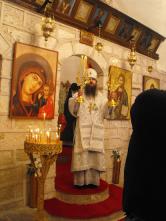 Archbishop Sophrony of St Petersburg invites people to join his pilgrimage to the Holy Land from December 1st-15th. Guided tours will be in Russian, and for those comfortable with the language, this is a wonderful opportunity to meet another of the Bishops of our Church. The group will also visit the parish of the Annunciation in the Nazareth, which is a part of ROCA.
Archbishop Sophrony of St Petersburg invites people to join his pilgrimage to the Holy Land from December 1st-15th. Guided tours will be in Russian, and for those comfortable with the language, this is a wonderful opportunity to meet another of the Bishops of our Church. The group will also visit the parish of the Annunciation in the Nazareth, which is a part of ROCA.
Vladika Sophrony wrote after his previous pilgrimage:
Jerusalem, Jerusalem, Jerusalem … I once thought that Jerusalem would remain an impossible dream for me.
My acquaintance with the great shrines began at Nazareth, with the church of the Annunciation and the place where the brothers Zebedee once lived (Apostles John and James). Next, I went to Jerusalem, meeting Patriarch Irineos, who is under house arrest. We visited the mountain monastery of St George the Chozebite.Next - the Jordan the monastery of St. Gerasimos of Jordan, where the holy family stopped in their flight from Herod. From the Mount of Temptation one can see the entire world which “lies in evil” - which the devil once offered to the God-man. At early liturgy in the church of the Nativity I saw where the Creator of the universe found refuge in a very narrow cave. The Judean Desert…Climb high into the mountains. Here the venerable Savvas founded the monastery with a strict rule prohibiting entrance for women. The monastery of St Theodosius. Here are the relics of St Euphrosyne of Polotsk. In the caves of this monastery the prophet Isaiah and King David hid. The Magi stayed here on their way back to their country after worshipping the Divine Infant Jesus.
The Lord allowed me to visit many other holy places connected with the earthly life and preaching of our Saviour Jesus Christ and the Blessed Virgin. We visited Hebron and the Oak of Mambre, which, unfortunately, does not uplift us with its greens. The field of the Shepherds, the Monastery of St. George, the Mount of Olives, the Church of St Mary Magdalene, where lie the relics of the venerable martyrs Grand Duchess Elizabeth and Nun Barbara. We followed the earthly footsteps of St John the Baptist, visited the temple of Protomartyr Stephen, the church of St Simeon, Capernaum, the site of the execution of the Sebaste martyrs, the cave in which St Nicholas laboured; We were at the well of patriarch Jacob; venerated the tomb of the Virgin Mary, the righteous Ancestors of God Joachim and Anna, and St Joseph the Betrothed, and also followed the path of our Lord and Saviour’s passion on His way to Golgotha. Freely paraphrased from Vladika Sophrony’s blog.
Those interested should contact Vladika Sophrony directly for more information and registration: email: vishegorod@inbox.ru or telephone +7 921 115 49 93. The cost of the pilgrimage is approximately USD1000, excluding airfares to Tel Aviv. See also the St Petersburg Diocese.
For those not fluent in Russian, it will possible to join future pilgrimage groups from our own Australian Diocese and from America. These will be announced in due course.
Thursday, August 21, 2014
From the Philokalia on FASTING
Suppose you have ordered yourself not to eat fish: you will find that the enemy continually makes you long to eat it. You are filled with an uncontrollable desire for the thing that is forbidden. In this way you can see how Adam’s fall typifies what happens to all of us. Because he was told not to eat from a particular tree, he felt irresistibly attracted to the one thing that was forbidden for him.
St John of Karpathos (7th century)
Those pursuing the spiritual way should train themselves to hate all uncontrolled desires until this hatred becomes habitual. With regard to self-control in eating, we must never feel loathing for any kind of food, for to do so is abominable and utterly demonic. It is emphatically not because any kind of food is bad in itself that we refrain from it. But by not eating too much or too richly we can to some extent keep in check the excitable parts of our body. In addition we can give to the poor what remains over, for this is the mark of sincere love.
Fasting, while of value in itself, is not something to boast of in front of God, for it is simply a tool for training those who desire self-restraint. The ascetic should not feel proud because he fasts; but with faith in God he should think only of reaching his goal. For no artist ever boasts that his accomplishment is simply due to his tools; but he waits for the work itself to give proof of his skill.
St Didachos of Photiki (5th century)
Tuesday, August 19, 2014
The Holy Transfiguration of our Lord and Saviour Jesus Christ
The transformation of Christ on Mount Tabor symbolizes the spiritual transformation that is expected of each Christian soul.
This process starts at our baptism, our spiritual birth. During our time on earth, praying at Church services, participating in confession, communion and the other Sacraments - our mind and heart gradually transform. Our thinking, understanding of life, priorities and tastes gradually change; and we acquire a taste and preference for prayer, spiritual reading and contemplation whilst here on earth, in this physical world. This is the required preparation for an eternal existence in a spiritual world with God.
For when the world ends, or when our body dies, all physical reality ends and we must exist either with good spirits (angels - in Heaven) or with evil spirits (demons - in hell). For us to be continually with our transfigured Lord it is essential to come to understand the power of His Resurrection, and then freely and voluntarily take part in His sufferings and passion (Philip. 3:10).
Before the appearance of Jesus Christ, the law and the prophets served as guidelines for moral life of people. Now God Himself witnesses in the presence of Moses and Elijah - the representatives of the Law and the prophets - that the Son of God has appeared on earth in bodily form. All people who wish to receive eternal salvation must listen to Him - “Hear Him!” (Lk 9:35) - He will open to us the true meaning of Moses’ Law and the prophets; He will announce to us a new perfect teaching, fulfilling which, we will receive eternal salvation!
Therefore if we don’t like to pray, or don’t pray; if we don’t like to go to church and read spiritual books, we are not ready to be with God in Heaven. If we like worldly entertainment, shows, sports, amusements, or any other physical occupation which steals our time and energy, then how is our soul going to be ready for Heaven? In such cases when the soul leaves its dead body and confronts God, the presence of God burns it and the soul suffers agony, instead of the joy that was intended…
Bishop Photius’ visit to Australia

On Sunday, 4/17 August, the commemoration of the Holy Seven Sleepers of Ephesus, Bishop Photius of Marathon visited the Greek parish of the Holy Dormition of the Mother of God. Protopriest Stylianos and Igumen John concelebrated.
Saturday, August 16, 2014
Kupola and Cross erected at the Annunciation Hermitage!

 Glory to God, on the day of St Anthony the Roman, Saturday 3/16th August workers put up a golden kupola and Cross over the church at the Annunciation Monastery.
Glory to God, on the day of St Anthony the Roman, Saturday 3/16th August workers put up a golden kupola and Cross over the church at the Annunciation Monastery.
Left - The kupola master builder - Dmitri Kichakov. Right - Blessing prayers




The workers managed to lift the kupola without the use of machinery.
We were blessed with good weather and no wind.


Left - View from St Hariton’s skete. Right - View from St Herman’s skete.

Note the local inhabitants wondering at this new sight
(circled in red, this and next 2 pictures).

Kangaroos are a common sight in this area - as are eagles, echidnas, and lizards…


Glory to God!
May He save all our workers and kind helpers!

Friday, August 15, 2014
From the Philokalia on FASTING and SPEECH
Some are most careful about the food they take in but negligent about the words they give out. To adapt Ecclesiastes (11:10), such men do not know how to remove anger from the heart or desire from the flesh. Only through the removal of these things is a pure heart established within us by the renewing Spirit.
You can achieve frugality by lowering the quantity of your food, and sinlessness in speech by raising the quality of your silence.
The ascetic must know when and by means of what food to treat the body as an enemy, when to encourage it as a friend, and when to succour it as an invalid. Otherwise he may unwittingly offer to the friend what is proper for the enemy, or to the enemy what is proper for the friend, and to the invalid what is proper for either of the other two, and having alienated all three he may find them fighting against him in time of temptation.
If, when eating, the nourishment in your food is more important to you than its savour, then the grace of tears will be given to you and you will begin to find spiritual refreshment; and you will forget all other taste, relishing its sweetness beyond that of anything else.
Ilias the Priest (? 6-7th century)
Wednesday, August 13, 2014
Dormition fast
Today starts the fast preparing Orthodox Christians for the Dormition of the Mother of God.
 This fast is not long, but it is quite strict. Fish is only allowed on the Great Feast of the Transfiguration (this year, Tuesday 19th August), and wine and oil are only allowed on Saturdays and Sundays, until the 28th of August, the Dormition of the Most-Holy Mother of God.
This fast is not long, but it is quite strict. Fish is only allowed on the Great Feast of the Transfiguration (this year, Tuesday 19th August), and wine and oil are only allowed on Saturdays and Sundays, until the 28th of August, the Dormition of the Most-Holy Mother of God.
Fasting is indispensable for Orthodox Christians. The Holy Church teaches that since Adam’s fall, body and soul in man are disordered. Man has become fleshly, and cannot sense or understand spiritual reality as intended by the Creator. But the Church provides us with a path towards God!
Fasting I call the eating of a little bit once a day. Getting up from the table when one is still hungry, having his food, bread, and salt, and his drink-water, which the springs themselves bring forth. Behold the royal way of receiving food; that is, many have been saved by this path, so the Holy Fathers have said.
St Paisius Velichkovsky, 18th Cent.
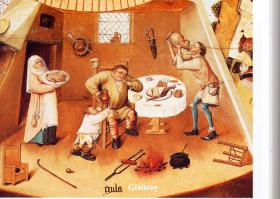 The Church prescribes us a simple medicine to remedy the imbalance of our fallen nature, and bring us closer to God again: fasting. If we are willing to fast for the sake of our bodies (i.e. diet), then we should be much more willing to do this for our soul! This is why Orthodox Christians abstain from meat, fish, and even oil during the fast. They also keep themselves carefully from every sin and bad habit, any excesses and entertainment. It is not unheard of that married couples abstain from sexual relations, and many families turn off the television completely in these two weeks. Most importantly: More time and attention is devoted to prayer in church and in the home.
The Church prescribes us a simple medicine to remedy the imbalance of our fallen nature, and bring us closer to God again: fasting. If we are willing to fast for the sake of our bodies (i.e. diet), then we should be much more willing to do this for our soul! This is why Orthodox Christians abstain from meat, fish, and even oil during the fast. They also keep themselves carefully from every sin and bad habit, any excesses and entertainment. It is not unheard of that married couples abstain from sexual relations, and many families turn off the television completely in these two weeks. Most importantly: More time and attention is devoted to prayer in church and in the home.
One of the most important [reasons for fasting is]: self–control. Every day we are inundated with thousands of messages, either visual or audible or both, which beckon, cajole, or beguile us to indulge ourselves in one form of excess or another. Statistical research has shown that we listen to these messages and act upon them. The average twentieth–century American enjoys a standard of living which was once reserved to high–placed aristocracy. In the heat of August, even a hundred servants with hand–held fans could not do for Louis XIV what a simple room air conditioner does for a retired widow in a small apartment in our time. What would Julius Cæsar have given for a chariot capable of traveling over sixty miles per hour, which could cover hundreds of miles in a single day? The luxury and comfort we enjoy tends to smother spiritual life even as the thorns choked out the seed in our Lord’s parable. Thus, to train ourselves in denial and self–control, to learn the art of gracefully declining a simple piece of cheese on an inappropriate day, is one of the more valuable lessons the Church can offer us.
A Guide to Orthodox Life, by Father David and Presbytera Julianna Cownie
Tuesday, August 12, 2014
Live transmission of Divine Liturgies from Holy Archangel Michael Sobor in Odessa
Vladika Agafangel has made available live transmission of Divine Services from his cathedral in Odessa, Ukraine. This initiative gives an opportunity for us in faraway Australia to remain connected to our Bishop and his cathedral services.
The Divine services channel is updated every Church feast day


